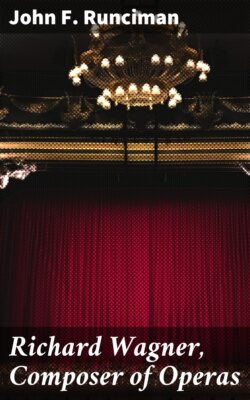Читать книгу Richard Wagner, Composer of Operas - John F. Runciman - Страница 28
На сайте Литреса книга снята с продажи.
III
ОглавлениеTable of Contents
The whole story of this first visit to Paris is sordid, squalid, miserable to a degree; and I don't know that we can be surprised. When Wagner sailed from Pillau he had not had a single work of any importance performed. Nay, more, he had not written a work of any importance. Die Feen had never been given; Das Liebesverbot had been given—under ridiculous circumstances and with the most disastrous results; his symphony had been played, but by this time score and parts had probably disappeared. Mendelssohn had received them in Leipzig and never once referred to them. Anyhow, none of these things were striking enough to have attracted much attention even in Germany; and they certainly would have excited no interest in busy, bustling Paris—the home of the Rossini and Meyerbeer opera, of quadrilles, vaudevilles and the rest. But for the happy, or rather unhappy, chance of meeting Meyerbeer in Boulogne, he would have entered the city without a line to any one of position. His money, as I have just said, gave out almost at once, and thenceforth he had to keep the wolf from the door by slaving at any odd jobs which would bring in a few pence. On more than one occasion he was reduced, literally, to his last penny. With marvellous resiliency of spirits he managed not only to pull through, but to complete Rienzi, then to write one great opera and begin planning two very great ones. We have accounts—mostly written long after the event—of merry meetings and suppers; but against them we must set the dozens of despairing letters and scribbled notes in which he complains of his luck and his lot. Yet, I say, how can we feel surprise? Why, he could not even play the piano well enough to give an opera-director any fair notion of his music; and perhaps that is just as well, so far as Paris was concerned, for the taste of the day was such that the better his compositions were understood the less they were liked. Hallé remarks that when he talked of his operatic dreams at this time he was commonly regarded as being a little, or more than a little, "off his head."
It became evident at the outset that all hopes anent the opera must fall to the ground. He met Scribe, the omnipotent libretto-monger of the day, and of course nothing came of it. The spectacle of Rienzi was on far too large a scale for the work to be possible at the Renaissance, so, much against the grain, he offered Anténor Joly Das Liebesverbot. He waited two months for a decided refusal or a qualified acceptance, but heard nothing. At last a word from Meyerbeer seemed to have settled the matter. One Dumersau, who translated the words into French, was very enthusiastic about the music and made Joly enthusiastic too; everything looked bright for the moment, and Wagner moved from the slum where he had been living to an abode a little less slum-like, in the Rue du Helder. On the day he moved the Renaissance went bankrupt again. I say again, because Joly became bankrupt punctually every three months—a fact which explains Meyerbeer's readiness to help him in that quarter. In desperation he seized the chance of earning a little money by writing the music for a vaudeville production, La Descente de la Courtille; but here again his luck was out: a more practised hand took the job from him. He composed what he considered simple songs adapted to the Parisian taste, and they were found too complicated and difficult to sing. To earn mere bread he arranged the more popular numbers of popular operas for all sorts of instruments and combinations of instruments, and in one of his notes we find him bewailing the sad truth that even this work was coming to an end for a time. However, he wrote on for Schlesinger's Gazette Musicale; for Lewald's Europa (German) and the Dresden Abendzeitung—though the work for the second two did not commence till later on. This toil perhaps brought him bread: it did nothing more; Minna had to pawn her trifles of jewellery; there seemed not a ray of hope gleaming on the horizon. The performance of his old Columbus overture did him a precious deal of good—especially as at the second performance—at a German concert arranged by Schlesinger—the brass were so frightfully out of tune that people could not make out what it was the composer would be at. It is needless to tell the ten times told miserable tale in further detail at this time of day; and I will now confine myself to the few facts that bear upon the fuller life that soon was to open before him.
